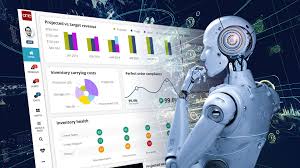Introduction
Businesses face growing demands to optimize supply chains. AI offers powerful tools for this task. Using AI in supply chain management can boost efficiency and cut costs. AI systems analyze data quickly and provide actionable insights.
Predictive analytics is one way AI improves supply chains. It helps companies forecast demand more accurately. This reduces excess inventory and prevents stockouts. Companies can also use AI for better supplier management. AI evaluates suppliers based on performance and reliability.
Logistics and transportation benefit from AI as well. AI optimizes delivery routes, saving time and fuel. Real-time tracking ensures timely deliveries. AI also helps predict maintenance needs for transportation fleets.
AI enhances risk management by spotting potential issues early. Machine learning models analyze data to identify risks before they become problems. This proactive approach keeps supply chains running smoothly.
Integrating AI into your supply chain strategy can transform operations. It offers new levels of efficiency and responsiveness. Embrace AI to stay ahead in a competitive market. Unlock the potential of AI to optimize your supply chain today.

Understanding AI in Supply Chains
Relevance of AI to Supply Chains: Supply chains are complex networks involving multiple stakeholders, vast amounts of data, and numerous interconnected processes.
AI optimizes AI Supply Chains management by automating routine tasks. Intelligent algorithms analyze vast amounts of data, making real-time decisions that streamline operations. For instance, AI-driven demand forecasting tools predict consumer behavior more accurately, allowing companies to adjust inventory levels proactively. This minimizes stock and overstock situations, leading to cost savings and improved customer satisfaction.
Historical Context: AI’s Evolution in Supply Chain Management
Artificial Intelligence (AI) has significantly transformed supply chain management over the years. Understanding this evolution provides insight into how AI has reshaped logistics, inventory management, and overall efficiency.
Before the widespread adoption of AI, supply chain management relied heavily on manual processes and basic automation. Businesses used traditional methods such as spreadsheets and rudimentary software to handle inventory and logistics. These early systems lacked the sophisticated algorithms needed to analyze complex data and forecast demand accurately.
Enhancing Efficiency with AI
AI significantly enhances demand forecasting accuracy by:
Analyzing vast datasets: AI can process and analyze massive amounts of data from various sources, including sales history, weather patterns, economic indicators, social media trends, and competitor activities.
Identifying complex patterns: AI algorithms can uncover hidden patterns and correlations within data that human analysts might miss. This leads to more accurate predictions of demand fluctuations.
Real-time adjustments: AI can continuously monitor and analyze real-time data to adjust forecasts as market conditions change. This helps businesses stay ahead of demand shifts.
Considering external factors: AI models can incorporate a wide range of external factors, such as holidays, promotions, and economic events, to improve forecast accuracy
Building Resilience with AI

In today’s fast-paced and ever-changing world, businesses need to be more resilient than ever before. This means being able to adapt to change, withstand shocks, and recover quickly from setbacks. Artificial intelligence (AI) is emerging as a powerful tool for building resilience and Optimizing Supply Chains with AI.
AI is a powerful tool for building resilience.
AI can help businesses to identify and mitigate risks, Optimizing supply chains, respond to disruptions, and recover from setbacks. It can also help businesses to become more agile and adaptable, so that they can thrive in an uncertain world.
AI can help businesses to identify and mitigate risks.
AI can be used to analyze vast amounts of data to identify potential risks and vulnerabilities. This information can be used to develop strategies to mitigate these risks and build resilience.
AI can help businesses to respond to disruptions.
AI can be used to automate tasks and processes, freeing up employees to focus on more important tasks. This can help businesses to respond to disruptions more quickly and effectively.
AI can help businesses to recover from setbacks.
AI can be used to analyze data from past disruptions to identify lessons learned and improve future responses. This can help businesses to recover from setbacks more quickly and efficiently.
AI can help businesses to become more agile and adaptable.
AI can be used to create new products and services, and to enter new markets. This can help businesses to stay ahead of the competition and thrive in an uncertain world.
Challenges and Considerations
Integrating AI into supply chains promises significant benefits, but it’s not without its challenges. Here are some common hurdles:
Future of AI in Supply Chains

AI is set to revolutionize supply chains. Expect hyper-accurate demand forecasting, predictive analytics to preempt disruptions, and autonomous inventory management. AI-powered robots will optimize warehouse operations, while blockchain ensures transparency and security. The result? More resilient, efficient, and sustainable supply chains.
Conclusion
By harnessing the power of AI, organizations can transform their supply chains into highly efficient and resilient engines of growth. Through improved forecasting, optimized inventory management, and proactive risk mitigation, AI empowers businesses to navigate complexities, reduce costs, and deliver exceptional customer experiences. The future of supply chain management undoubtedly lies in intelligent automation.
